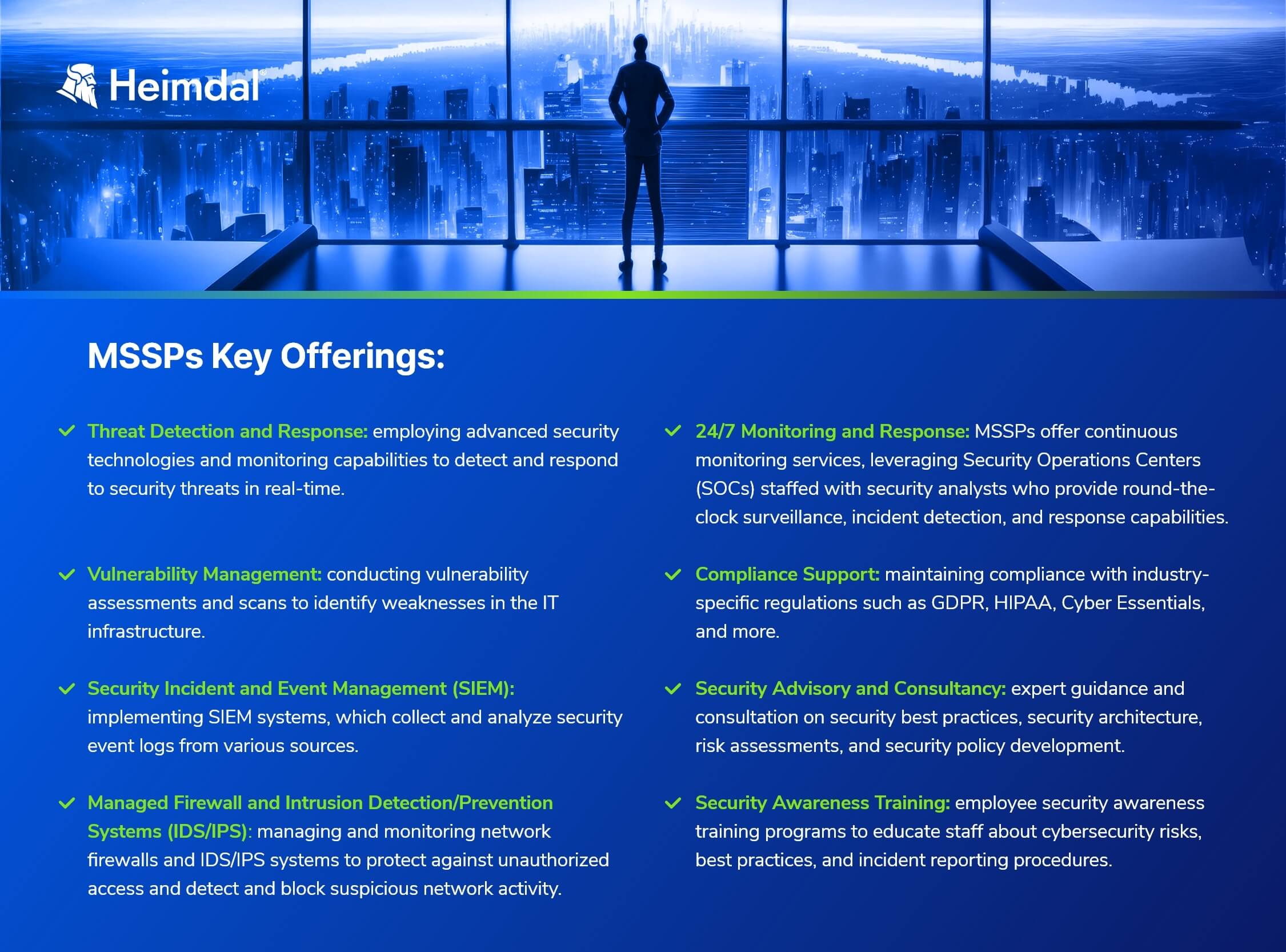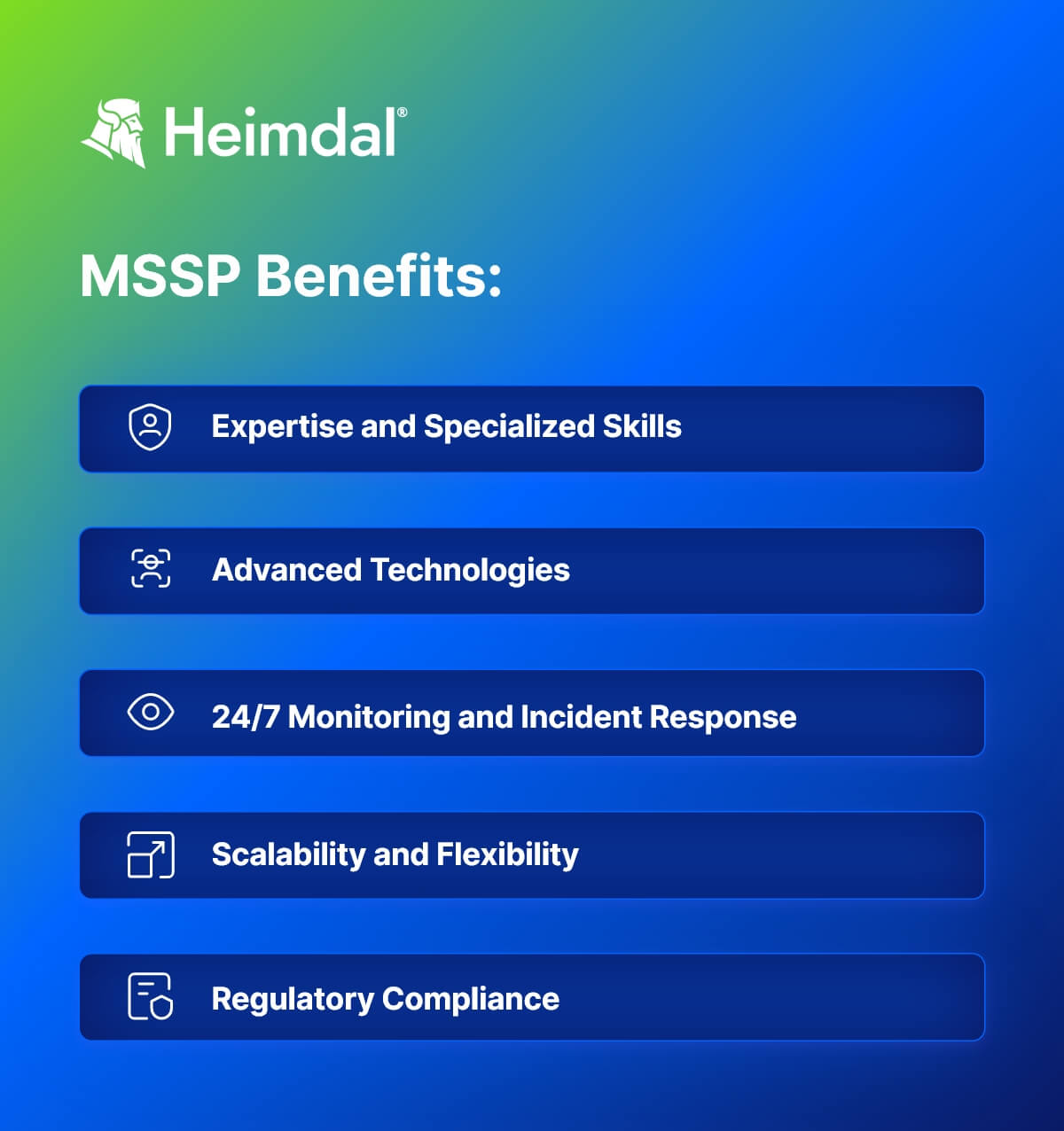Contents:
In today’s digital landscape, businesses face an ever-increasing array of cybersecurity threats. Protecting sensitive data and infrastructure from malicious actors requires expertise, advanced technologies, and round-the-clock vigilance.
Training and maintaining an in-house cybersecurity team can be costly – that’s where Managed Security Service Providers (MSSPs) come in.
In this article, we will delve into the world of MSSPs, exploring their definition, benefits, and offerings, how to choose the right one, their history, distinguishing them from Managed Service Providers (MSPs), and examining current market trends surrounding MSSPs.
So let’s dive right in!
What Is an MSSP?
A Managed Security Service Provider (MSSP) is a third-party service provider that specializes in managing and monitoring an organization’s security systems and infrastructure. They take on the responsibility of safeguarding your critical information from potential cyber threats, allowing you to focus on running your business.
MSSPs specialize in monitoring, detecting, and responding to security threats. They provide advanced security solutions, experienced professionals, and cutting-edge technologies to safeguard their clients’ critical assets.

Short History
MSSPs first emerged in the late 1990s, as a service offered by Internet Service Providers (ISPs). Initially, MSSPs focused primarily on providing firewall and intrusion detection/prevention services.
Over time, MSSPs have evolved to provide a wide range of security services, including managed antivirus and anti-spam protection, vulnerability management, incident response, and more.
Today, with over 10,000 providers in operation worldwide, MSSPs have become an essential part of organizations’ security strategy.
MSP vs MSSP
While Managed Service Providers (MSPs) focus on managing and maintaining IT infrastructure, MSSPs specifically specialize in cybersecurity.
MSPs provide broader IT support, including hardware maintenance, network management, and software updates. In contrast, MSSPs concentrate on proactive threat detection, incident response, vulnerability management, and security advisory services.
It’s important to mention that while the primary focus of MSPs is managing and maintaining a client’s IT infrastructure, some MSPs can also offer managed cyber security services.
MSSP vs SOC
A SOC is a dedicated team responsible for real-time monitoring and response to security threats and incidents. In contrast, an MSSP is a company that offers a broader range of security services, catering to the ongoing security needs of businesses.
Therefore, an MSSP’s offerings extend beyond incident response, encompassing proactive security measures and continuous support.
Why Should Companies Partner with an MSSP?
If you’re looking to improve your organization’s cybersecurity posture, an MSSP can be an invaluable partner. They serve a diverse range of businesses across industries, addressing the unique cybersecurity challenges faced by each sector.
Here are the main benefits an MSSP could bring to a business:
- Expertise and Specialized Skills: MSSPs have dedicated security professionals with extensive knowledge and experience in the field, capable of identifying and addressing a wide range of security threats.
- Advanced Technologies: MSSPs leverage sophisticated tools and technologies, such as Security Information and Event Management (SIEM) systems, to provide robust security solutions that offer real-time threat detection and response capabilities.
- 24/7 Monitoring and Incident Response: MSSPs offer round-the-clock monitoring, threat detection, and rapid incident response capabilities, ensuring immediate action is taken to mitigate risks and minimize potential damages.
- Scalability and Flexibility: MSSPs can adjust their services to meet the evolving needs of businesses, allowing them to scale security operations as required, whether it’s expanding to accommodate growth or scaling down during quieter periods.
- Regulatory Compliance: MSSPs help businesses navigate complex compliance frameworks by implementing the necessary security controls, conducting audits, and providing ongoing support to ensure adherence to industry regulations.

How to Choose the Right MSSP?
When it comes to choosing an Managed Security Service Provider, there are some key factors you need to keep in mind. Here are a few tips on how to choose the right one for your business:
1. Make sure the MSSP has experience in your industry. Look for MSSPs with a proven track record and experience in your industry. A deep understanding of your sector’s specific security challenges and compliance requirements is vital.
2. Carefully assess their service offerings. Assess the range of services provided by the MSSP and ensure they align with your specific security needs. Look for comprehensive offerings, including threat detection and response, vulnerability management, compliance support, and security advisory services.
3. Evaluate their security infrastructure. Evaluate the MSSP’s security operations center (SOC), technologies, and methodologies. Ensure they have robust systems in place for monitoring, analyzing, and responding to security events effectively.
4. Assess customer support and Service Level Agreements (SLAs). Consider the responsiveness, availability, and support provided by the MSSP. Ensure they offer clear SLAs that align with your business requirements, including incident response times and communication protocols.
5. Check compliance and certifications. MSSPs may provide services tailored to regulated industries based on the specific nature of a business. For instance, certain businesses must comply with industry-specific regulations like HIPAA or GDPR, and accordingly, MSSPs offer services to help meet these compliance requirements.
6. Get references from other businesses that have used the MSSP’s services. Research the MSSP’s reputation in the industry and seek references from their existing clients. Feedback and testimonials can provide valuable insights into their capabilities, reliability, and customer satisfaction.
Remember that selecting the right MSSP is an investment in long-term security, so conducting thorough due diligence is crucial for a successful partnership.
Pros and Cons of MSSPs:
A Managed Security Service Provider offers a range of benefits to businesses looking to enhance their security posture. However, like any other service, they also come with their own set of pros and cons. Let’s take a closer look at both sides.
Pros:
- Access to specialized expertise and advanced technologies.
- Cost-effective alternative to building an in-house security team.
- 24/7 monitoring and rapid incident response capabilities.
- Scalability and flexibility to adapt to changing business needs.
- Assistance with regulatory compliance.
Cons:
- Dependence on an external provider for critical security functions.
- Communication and coordination challenges may arise between the MSSP and the business.
- The possible exposure of private information when security operations are contracted out.
Market Trends around MSSPs
In recent years, the demand for MSSPs has increased due to the growing sophistication and volume of cyber threats. Key market trends include:
Rise in Cloud-based Security – MSSPs are leveraging cloud technologies to deliver security services more efficiently and effectively.
Integration of AI and Machine Learning – MSSPs are incorporating artificial intelligence and machine learning algorithms to enhance threat detection and automate security processes.
Focus on Endpoint Security – With the proliferation of remote work and mobile devices, MSSPs are placing greater emphasis on securing endpoints.
Threat Intelligence Sharing – MSSPs are collaborating and sharing threat intelligence to stay ahead of emerging threats.
How Can Heimdal® Benefit MSSPs?
If you’re an MSSP looking for a game-changing solution that can help you elevate your security capabilities, then our unified, cloud-delivered XDR platform is the right choice for you.
Here are the key features that make Heimdal’s XDR platform the perfect MSSP software stack:
- Real-Time Threat Hunting and Response: Heimdal XDR equips security and IT teams with advanced threat intelligence, bi-lateral telemetry, and detailed forensics information.
- Intelligent Insights for all Operations: With Heimdal XDR, MSSPs gain access to pre-computed risk scores, indicators, and in-depth attack analysis. This information is presented in various investigative and insightful views, enabling security teams to take swift action when potential threats arise.
- Automated Remediation & Response: The Heimdal XDR platform features an Action Center, enabling seamless one-click automated and assisted actions across the digital enterprise. This capability allows MSSPs to respond rapidly and efficiently to potential threats, ensuring the safety and security of business operations and data.
Request a demo today and supercharge your team with a cutting-edge, unified platform that can replace up to seven different security vendors!
Wrap Up
Managed Security Service Providers (MSSPs) have become indispensable partners for businesses seeking robust cybersecurity solutions. By leveraging their expertise, advanced technologies, and round-the-clock monitoring, MSSPs help organizations proactively detect, respond to, and mitigate cyber threats.
Choosing the right Managed Security Service Provider is crucial to ensure optimal protection and peace of mind in today’s rapidly evolving threat landscape.
If you liked this article, follow us on LinkedIn, Twitter, Facebook, and Youtube, for more cybersecurity news and topics.










 Network Security
Network Security
 Vulnerability Management
Vulnerability Management
 Privileged Access Management
Privileged Access Management  Endpoint Security
Endpoint Security
 Threat Hunting
Threat Hunting
 Unified Endpoint Management
Unified Endpoint Management
 Email & Collaboration Security
Email & Collaboration Security









